Shinken — the Katana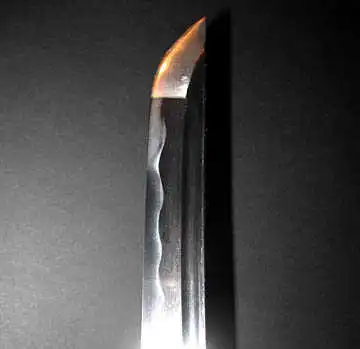 How to find a sharp steel sword for iaido trainingIn iaido and similar arts, you train by yourself in kata, fixed combinations of movements. Therefore you can use a real sword, instead of a bokken or shinai, which are used for pair exercises in aikibatto, kenjutsu, aikiken, and kendo. The real live blade sword, shinken, is the katana traditionally made in a painstaking process, and costing accordingly. It would be hard to find a decent katana for less than around $ 5,000 — but quite easy to spend significantly more on it.
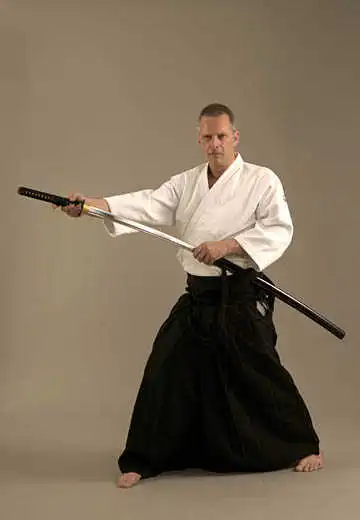 In a more affordable price range are sharp steel swords made in a simpler fashion, outside of Japan — but still with the Japanese design. In Japan, there is a law against steel swords that are not made in the traditional way. These modern versions of the katana are usually called shinken, too, because they are sharp and made of steel. Foreign made shinken usually cost between $ 1,500 and 3,000. The Scandinavian martial arts supplier SBI Budo has developed a shinken for only $ 600. I have assisted them in this process, so that the sword should be suitable for iaido, aikibatto solo exercises, and similar practice. This sharp steel katana is made in China. It is not made in the traditional way, but hand-made with a care and concern that is quite sufficient.
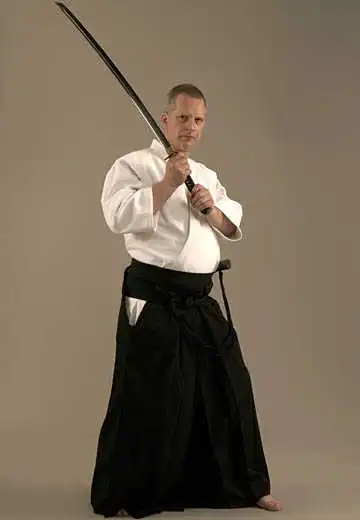 Of course, it cannot compare to the classical Japanese shinken, nor to foreign shinken forged according to that tradition. But I have not yet found another sword at this low price that matches it — and I have tried a lot of them. As you may know, it is even hard to find a decent iaito, the unsharpened katana made of alloy, at such a low price. The blade is forged by hand out of high-carbon steel, in the maru way, i.e. with one kind of steel all through. It has the traditional ihori shape of the ridge. It is formed in a smooth curve, and has a fine balance. It has a groove, and the mounting is done in the normal way for swords used in iaido practice.
 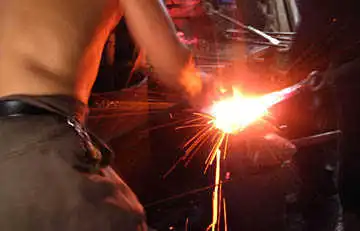 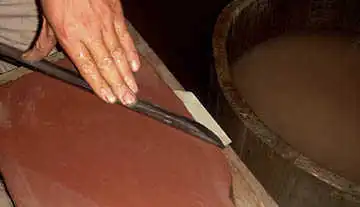 The Chinese swordsmith at work.
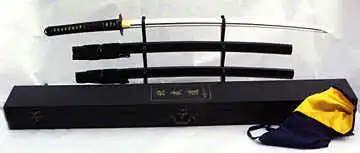 The shinken set. The stand is not included. The weight of the sword (without the saya) is one kilogram (2.2 pounds). Its blade is 74 centimeters (2.4.5 in Japanese shaku measurement, slightly more than 29 inches). It is not available in other lengths, but 2.45 shaku should be fine for all but very tall or very short people. It is delivered in a wooden box, with two saya — one glossy and one not, both black. The tsuba, sword guard, has the famous Musashi design.
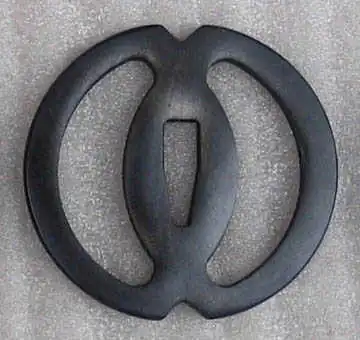 I can recommend this sword for iaido and similar practice. When it comes to tameshigiri, test cutting, I would say that you cannot trust this blade on sturdy objects or thick ones. Surely, this sharpened carbon steel blade can cut through a lot of things, but if it is tameshigiri you focus on in your sword practice, you may want to get a sword of a higher quality — and prepare to pay the price for it. In regular iaido training, though, I don't see much need for a more fancy or expensive sword than this one.
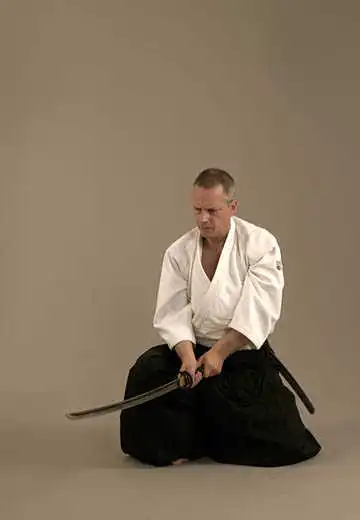
How to get the swordI have made arrangements with SBI Budo, so that you can buy the sword directly from me. The price within Europe is Euro € 420, shipping included. The price outside Europe is USD $ 690, shipping included. The higher price outside Europe is because of significantly higher exporting and shipping costs.If you want to order the sword, click one of the PayPal buttons below. They take you to my PayPal account, where you can pay with a major credit card, or through your PayPal account, if you have one. Allow two to three weeks for delivery. If you have questions, use the below form to get in touch with me. Please observe that some countries may have regulations about buying swords. Make sure that you know if there are any restrictions in your country, before you order one.
Words of cautionIf you get this or another sharp steel sword, please handle it with caution and respect, to avoid accidents. For example, if you practice something that you are not familiar with, try it out with bokken, a woodens sword, first. And be very careful in movements where you risk cutting yourself, such as nukitsuke, the draw, noto, when you sheathe the sword, and any movement where the blade gets close to you.Be particularly careful when training with your sword in the company of others. Use a proper safety distance, and never swing your sword forcefully in the directions of others, even if they are far away.
This steel sword is not made particularly for tameshigiri, test cutting, but can be used for it to some extent. Be careful, though. This is how most students damage their sword. Try tameshigiri on easy objects, like one rolled tatami or something similar. Not hard ones, and not very thick ones. If you want to do a lot of heavy duty tameshigiri, you should get a sword specifically made for that. In your regular care of the sword, check the mekugi pin on tsuka, the sword grip. It holds the blade to tsuka, so if it breaks or pops up, the blade might actually go flying. Keep this in mind, and check the mekugi pin regularly. Generally speaking, if you regard your sword as a very long knife, and treat it accordingly, you should be fine. And the respect you show the sword is an essential part of the Japanese sword arts.
Stefan Stenudd
To buy the swordTo order the shinken sharp steel sword, press one of the PayPal buttons below. They take you to a PayPal secure order form, where you can use any major credit card, or pay through your own PayPal account, if you have one. If you don't have PayPal, you can still order the sword.The price within Europe is Euro € 420, shipping included. The price outside Europe is USD $ 690, shipping included. The higher price outside Europe is because of significantly higher exporting and shipping costs. Make sure to fill in the order form correctly, especially your address. Also, please give your correct email address, so that I can contact you if needed. I will never release your email to others. If you have any questions or requests — either prior to your order, or afterward — you can use the form below. When you have completed your order, you will be returned to this webpage — also if you cancel your order. I am confident that you will be very pleased with the sword. Use the form below, and let me know if I am right or wrong about that, when you have received it.
Shinken order To order the shinken sharp steel sword, including two saya, a protective bag of fabric, and the wooden box, press one of the buttons below (one for European orders, the other for non-European orders). The price within Europe is Euro € 420, shipping included. The price outside Europe is USD $ 690, shipping included. The higher price outside Europe is because of significantly higher exporting and shipping costs. To order the shinken sharp steel sword, including two saya, a protective bag of fabric, and the wooden box, press one of the buttons below (one for European orders, the other for non-European orders). The price within Europe is Euro € 420, shipping included. The price outside Europe is USD $ 690, shipping included. The higher price outside Europe is because of significantly higher exporting and shipping costs.
© Stefan Stenudd, 2000. You are free to any non-commercial use of this material, without having to ask for my permission. But please refer to this website, when doing so.
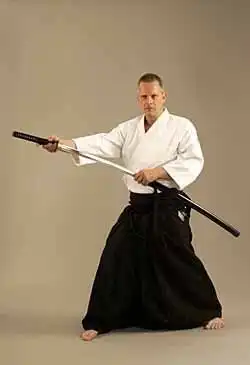
AikibattoIntroductionBackgroundAikibatto BasicsSword exercisesJo staff exercisesSolo video clipsDuo video clipsKen suburiCorrectionsGlossaryVisitor responseShinken, the swordAikibatto — the book
About CookiesMy Other WebsitesCREATION MYTHSMyths in general and myths of creation in particular.
TAOISMThe wisdom of Taoism and the Tao Te Ching, its ancient source.
LIFE ENERGYAn encyclopedia of life energy concepts around the world.
QI ENERGY EXERCISESQi (also spelled chi or ki) explained, with exercises to increase it.
I CHINGThe ancient Chinese system of divination and free online reading.
TAROTTarot card meanings in divination and a free online spread.
ASTROLOGYThe complete horoscope chart and how to read it.
MY AMAZON PAGE
MY YOUTUBE AIKIDO
MY YOUTUBE ART
MY FACEBOOK
MY INSTAGRAM
MY TWITTER
STENUDD PÅ SVENSKA
|
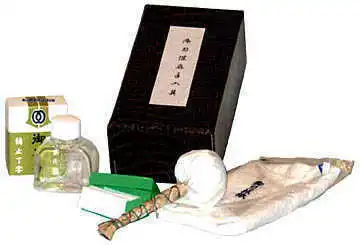 Most steel swords — this one, too — can start to rust, if not properly cared for. After training, make sure to use a regular sword care set to clean and oil the blade. That is the uchiko powder and the choji oil. You can substitute these materials with others, as long as you make sure they do the job. You can easily find a sword care set in a martial arts store, or on the internet.
Most steel swords — this one, too — can start to rust, if not properly cared for. After training, make sure to use a regular sword care set to clean and oil the blade. That is the uchiko powder and the choji oil. You can substitute these materials with others, as long as you make sure they do the job. You can easily find a sword care set in a martial arts store, or on the internet.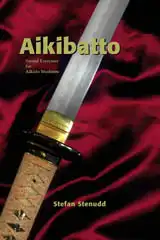 Aikibatto — Sword Exercises for Aikido Students
Aikibatto — Sword Exercises for Aikido Students